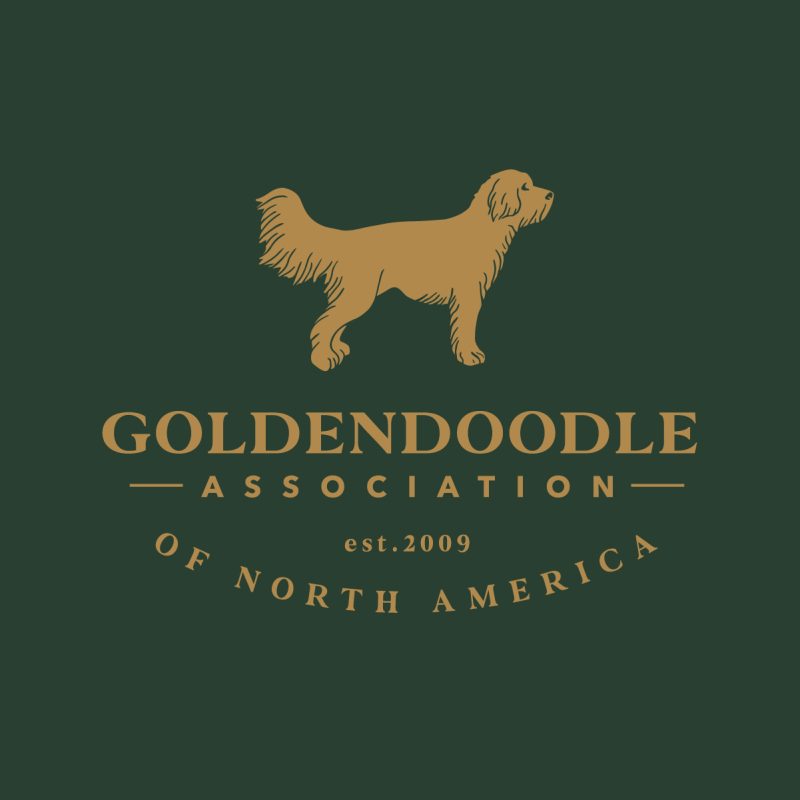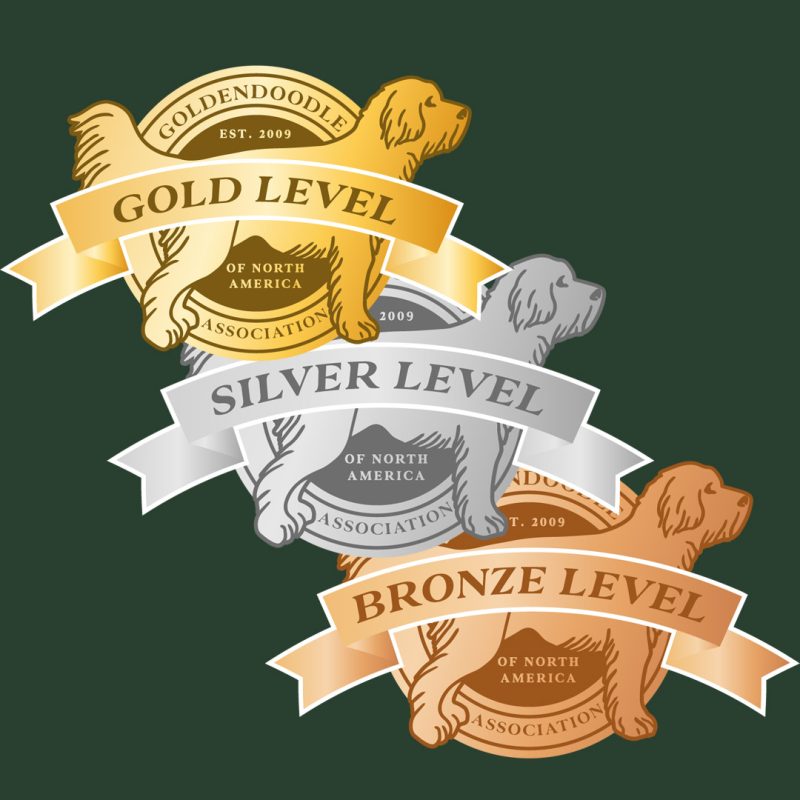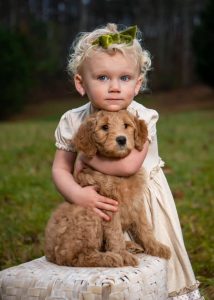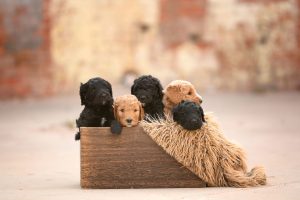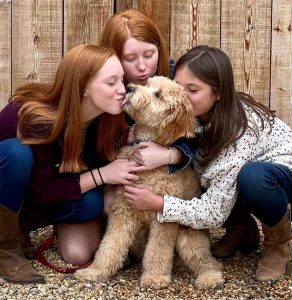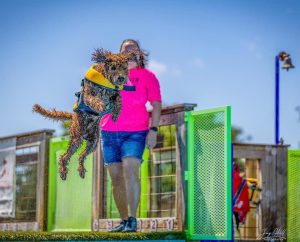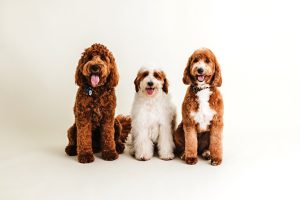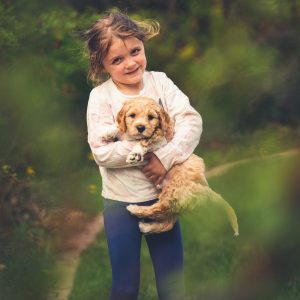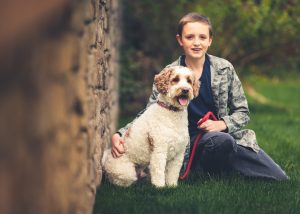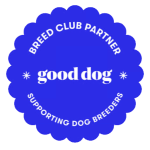Goldendoodles are an exceptional crossbreed that bring so much joy to many people. They have several qualities that make them an ideal companion breed due to their temperament, versatility, hypoallergenic quality, and excellent health outcomes. Explore these characteristics below as well as GANA’s commitment to the breed.
Temperament
Goldendoodles are known for their friendly and gentle nature. They are often good with children and other pets making them suitable for families. Goldendoodles are known for their intelligence; they are highly trainable and eager to please. They are typically active dogs that enjoy exercise and outdoor activities. This makes them suitable for individuals or families who enjoy an active lifestyle and want a canine companion for outdoor adventures. They love to play! Like many other intentionally breed poodle mixes, Goldendoodles are known for having an extended puppyhood and will need structured obedience training to be successful family members. While many people choose a Goldendoodle for the companionship they offer, they are a very versatile breed suitable for many activities such as service and therapy work, barn hunt, agility, obedience training, scent work, and so much more! These dogs often form strong bonds with their owners and can be affectionate and loving. They are sensitive dogs that require a soft hand when disciplining.
Hypoallergenic
Goldendoodles are hypoallergenic and often have a low-shedding coat with the exception of unfurnished of flat-coated dogs (see Goldendoodle Appearance for more information). This can be advantageous for individuals or families with allergies to dogs. However, it is important to understand what hypoallergenic truly means. The term hypoallergenic is composed of the root words ‘hypo,’ which means less, and ‘allergenic,’ which means the ability to induce an allergic reaction1. Hypoallergenic is a layman’s term used to suggest that the majority of people who experience allergies to dogs will not be allergic to dog breeds with a specific coat type. Allergies are very intricate and individualized to the person who experiences them. This is why GANA member breeders cannot guarantee that someone who is allergic to dogs will not have an allergic response to Goldendoodles.
Jennifer Bishop-Jenkins, a certified master groomer with forty years of grooming experience, has previously described the difference between dogs with hair or fur2,3. Though hair and fur are the same on the cellular level, practically speaking, hair and fur are used to differentiate dog coat types. Breeds referred to as hypoallergenic tend to have hair as opposed to fur. As a result, they have reduced shedding. Some examples are Poodles, Bichon Frisés, several terrier breeds, and furnished Goldendoodles4. This list of breeds is largely based on anecdotal evidence presented by people who are allergic to dogs but report fewer symptoms when in contact with hypoallergenic dog breeds5. This doesn’t mean that no one will ever be allergic to hypoallergenic dog breeds, but it does mean that many people who suffer from dog allergies may have fewer or no allergy symptoms in response to exposure to these breeds. For more information, please see ‘The Hypoallergenic Dog’ from the Functional Dog Collaborative.
The Health Benefits of the Goldendoodle
Limiting the genetic diversity within dogs has had serious implications on the health and prevalence of genetic diseases within breeds. Inbreeding results in a loss of alleles or traits within a given breed by narrowing the gene pool. While this creates homozygosity within a breed (i.e., purebred dogs) it increases the likelihood for those dogs to exhibit genetic diseases such as various cancers, elbow dysplasia, and hypothyroidism6. Intense selection for physical traits of domestic dogs over the last century has created a genetic bottleneck for many breeds; random decreases in genetic variation resulted in small founding populations which lead to genetic drift or loss of some specific traits7.
Purebred dogs are more likely to be afflicted with genetic diseases6 and genetic damage8, while mixed breed dogs are more likely to be carriers and unaffected by diseases9. Furthermore, inbreeding has been linked to decreased health, lifespan10, and fertility11. In fact, the average inbreeding of 227 purebred breeds was 25% which is equivalent to sharing the same genetic material as a full sibling12. Several purebred dog breeds have become synonymous with specific genetic diseases: Doberman Pinschers and dilated cardiomyopathy13, Golden Retrievers and cancer14, and Poodles and progressive retinal atrophy15. Outcrossing or crossbreeding dogs can genetically ‘rescue’ dogs meaning it can improve the genetic variants in their genome. Mixed breed dogs tend to have a greater amount of genetic diversity when compared to purebred dogs which creates healthier populations in the breed.
While there is very little scientific literature regarding the health outcomes specific to Goldendoodles, some information has been reported by insurance companies. Nationwide pet insurance reported that Goldendoodles were 75% less likely to have a cancer claim than both Golden Retrievers and Standard Poodles combined16. Individually, Golden Retrievers and Poodles are 95% and 44% more likely to have a claim for cancer, respectively. Furthermore, Trupanion Pet Insurance reported at the GANA Breeder Conference 2023, that Goldendoodles registered through GANA breeders have had zero claims of hip dysplasia and less claims for eye conditions. When all information regarding genetic diversity and canine health is taken together, it is reasonable then to suggest that Goldendoodles, especially those from GANA breeders, are less likely to exhibit serious health issues and live longer lives.
GANA’s Commitment to the Health of the Goldendoodle
GANA is dedicated to fostering and improving the genetic diversity within Goldendoodles. Health and longevity are vital qualities for any pet and much appreciated by the owners who love them. For GANA, an open stud book means that we welcome the ability for purebred dogs outside of a formal kennel registry to be bred to create Goldendoodles. All Goldendoodles registered with GANA must have genetic ancestry from Golden Retrievers, poodles, and/or Goldendoodles. The dogs used for breeding can either be verified by a 3-generation pedigree, registration with a kennel club (i.e., AKC, UKC, etc.), or genetically through a canine genetic testing company. Committing to an open stud book ensures that our breed will continue to remain healthy by introducing various bloodlines regularly.
Citations
- “Hypoallergenic.” Merriam-Webster Dictionary, 3 Mar 2023. https://www.merriam-webster.com/dictionary/hypoallergenic. Accessed 11 Mar. 2023.
- Bishop-Jenkins, Jennifer. “Fur vs Hair”. June 4 2021. Accessed Mar 16 2023.
- 12. Coile, Caroline. “Does My Dog Have Hair or Fur?”. Nov 28 2022. Accessed Mar 16 2023.
- “Hypoallergenic Dogs.” American Kennel Club. Accessed 11 Mar 2023. https://www.akc.org/dog-breeds/hypoallergenic-dogs/page/3/
- Doris W. Vredegoor, Ton Willemse, Martin D. Chapman, Dick J.J. Heederik, Esmeralda J.M. Krop, Can f 1 levels in hair and homes of different dog breeds: Lack of evidence to describe any dog breed as hypoallergenic. Journal of Allergy and Clinical Immunology, Volume 130, 4, (2012). 904-909.e7. https://doi.org/10.1016/j.jaci.2012.05.013
- Bellumori TP, Famula TR, Bannasch DL, Belanger JM, Oberbauer AM. Prevalence of inherited disorders among mixed-breed and purebred dogs: 27,254 cases (1995-2010). J Am Vet Med Assoc. 2013 Jun 1;242(11):1549-55. doi: 10.2460/javma.242.11.1549. PMID: 23683021.
- Mabunda, R.S.; Makgahlela, M.L.; Nephawe, K.A.; Mtileni, B. Evaluation of Genetic Diversity in Dog Breeds Using Pedigree and Molecular Analysis: A Review. Diversity 2022, 14, 1054. https://doi.org/10.3390/d14121054
- Santovito, A., Saracco, M., Scarfo’, M. et al. Purebred dogs show higher levels of genomic damage compared to mixed breed dogs. Mamm Genome (2023). https://doi.org/10.1007/s00335-023-10020-5
- Donner J, Anderson H, Davison S, Hughes AM, Bouirmane J, Lindqvist J, Lytle KM, Ganesan B, Ottka C, Ruotanen P, Kaukonen M, Forman OP, Fretwell N, Cole CA, Lohi H. Frequency and distribution of 152 genetic disease variants in over 100,000 mixed breed and purebred dogs. PLoS Genet. 2018 Apr 30;14(4):e1007361. doi: 10.1371/journal.pgen.1007361. Erratum in: PLoS Genet. 2019 Jan 18;15(1):e1007938. PMID: 29708978; PMCID: PMC5945203.
- Kraus C, Snyder-Mackler N, Promislow DEL. How size and genetic diversity shape lifespan across breeds of purebred dogs. Geroscience. 2023 Apr;45(2):627-643. doi: 10.1007/s11357-022-00653-w. Epub 2022 Sep 6. PMID: 36066765; PMCID: PMC9886701.
- Chu ET, Simpson MJ, Diehl K, Page RL, Sams AJ, Boyko AR. Inbreeding depression causes reduced fecundity in Golden Retrievers. Mamm Genome. 2019 Jun;30(5-6):166-172. doi: 10.1007/s00335-019-09805-4. Epub 2019 May 21. PMID: 31115595; PMCID: PMC6606663.
- Bannasch, D., Famula, T., Donner, J. et al. The effect of inbreeding, body size and morphology on health in dog breeds. Canine Genet Epidemiol 8, 12 (2021). https://doi.org/10.1186/s40575-021-00111-4
- Wess G, Schulze A, Butz V, Simak J, Killich M, Keller LJ, Maeurer J, Hartmann K. Prevalence of dilated cardiomyopathy in Doberman Pinschers in various age groups. J Vet Intern Med. 2010 May-Jun;24(3):533-8. doi: 10.1111/j.1939-1676.2010.0479.x. Epub 2010 Feb 23. PMID: 20202106.
- Kent MS, Burton JH, Dank G, Bannasch DL, Rebhun RB. Association of cancer-related mortality, age and gonadectomy in golden retriever dogs at a veterinary academic center (1989-2016). PLoS One. 2018 Feb 6;13(2):e0192578. doi: 10.1371/journal.pone.0192578. PMID: 29408871; PMCID: PMC5800597.
- Freitas HM, Somma AT, Moore BA, Montiani-Ferreira F. Retrospective and prospective study of progressive retinal atrophy in dogs presented to the veterinary hospital of the Federal University of Parana, Brazil. Open Vet J. 2021 Jul-Sep;11(3):370-378. doi: 10.5455/OVJ.2021.v11.i3.6. Epub 2021 Jul 22. PMID: 34722198; PMCID: PMC8541721.
- ‘Canine Cancer’. Nationwide Veterinary Analytics. 2023 Feb 15. https://www.petinsurance.com/veterinarians/research/?_gl=1n8s3bo_gaNTY0NTU0NTQ1LjE3MDI1MzAwNDQ._ga_GLJSQEPWL4*MTcwMjUzMDA0NS4xLjEuMTcwMjUzMDA1Ni40OS4wLjA.
Looking for a puppy?
View our Breeder Members on our Breeder Directory.


